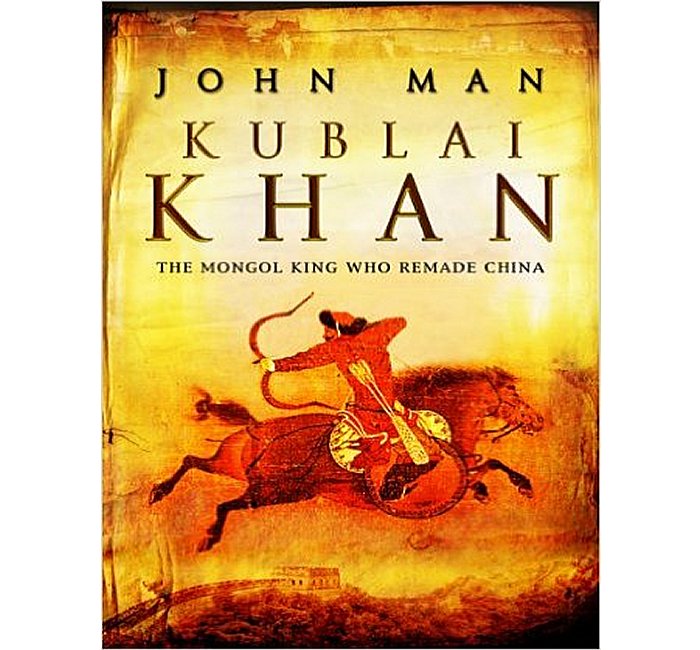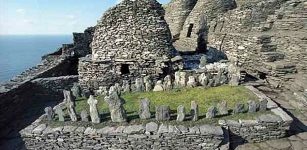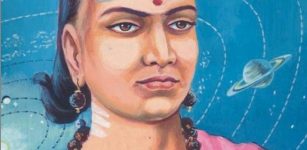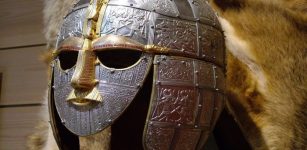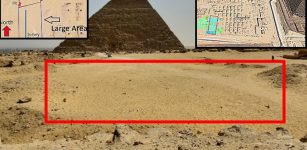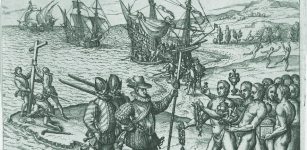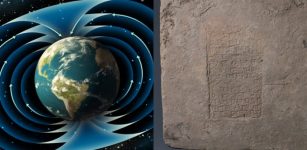Emperor Kublai Khan: One Of The Most Powerful People In Human History
MessageToEagle.com – The thirteenth-century Mongolian prince, Kublai Khan, was one of the most powerful people in the history of mankind.
Kublai Khan was the grandson of the great Mongol conqueror, Genghis Khan. He is known as the founder of China’s Yuan Dynasty (1271 – 1368).
Born in 1215, Kublai was the second son of Toluia and Sorghaghtani Beki (1190-1252). Kublai’s mother raised him and his three brothers after their father’s death.
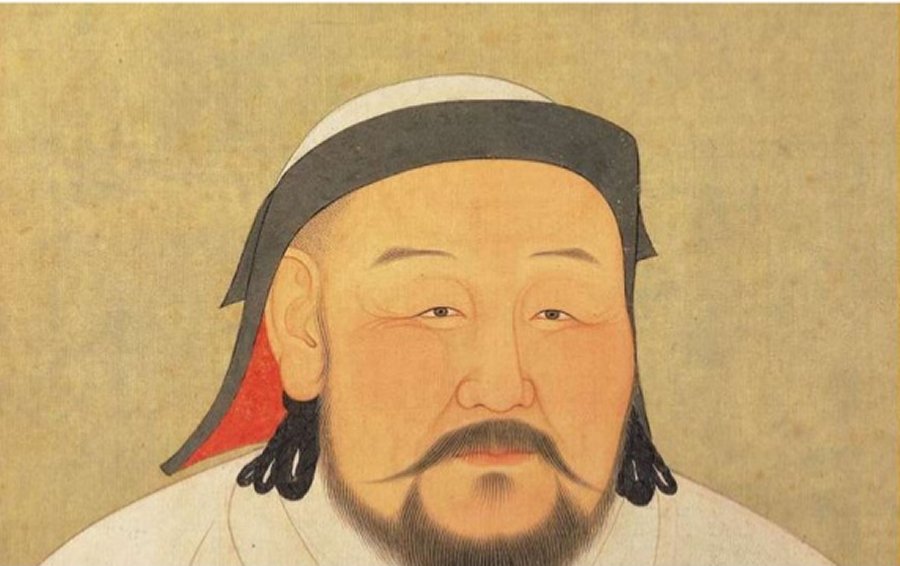
Kublai inherited the second largest land empire in history from his grandfather, Genghis Khan, and he successfully managed to greatly expand his territory, which was vast and stretched over half of the entire Asian continent.
He seized power in his forties but he perceived China rather than Mongolia as the key to empire. He was very interested in the culture of the Chinese and studied Buddhism and Confucianism, the philosophies of Ancient China.
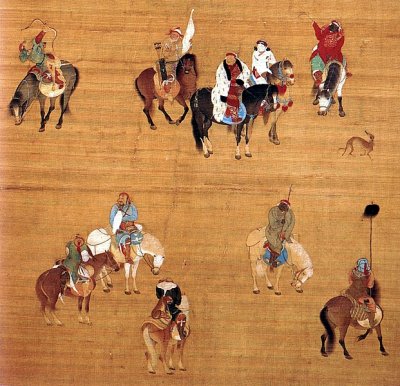
When Kublai was in his thirties, his older brother Mongke became Khan of the Mongol Empire.
Mongke promoted Kublai to the ruler of Northern China and a few years later, he asked him to attack and conquer southern China and the Song Dynasty.
The emperor Mongke was namely, determined to complete the conquest of China.
He therefore entrusted Kublai with responsibility for keeping order in conquered territory.
After Mongke’s death in 1259, Kublai had himself proclaimed khan.
One of his great dreams was to become the Great Khan, one day, but the same dream had also his brother, Arigh Boki, who with the help of support of several Mongols, challenged the throne.
Kublai won over Boki when he cut off supplies to the southern empire.
See also:
Karakorum – Genghis Khan’s Headquarters And Important City In History Of Silk Road
Pax Mongolica: Time Of Peace And Stability That Helped To Spread Technologies And Inventions
Kublai was claimed “Great Khan” in 1260.
In March, 1271, Kublai established the Yuan Dynasty (1271-1368) and proclaimed himself the emperor, later called Yuan Shizu. Afterwards, he strengthened his reign in the northern area and defeated the Southern Song Dynasty (1127-1129). During the 20 years he completed the unification of China. He made his capital in what is now Beijing.
Kublai Khan lives on in the popular imagination thanks to these two lines of poetry by Coleridge. But the true story behind this legend is even more fantastic than the poem would have us believe. He inherited the second largest land empire in history from his grandfather, Genghis Khan. He promptly set about extending this into the biggest empire the world has ever seen, extending his rule from China to Iraq, from Siberia to Afghanistan. His personal domain covered sixty-percent of all Asia, and one-fifth of the world’s land area.
The West first learnt of this great Khan through the reports of Marco Polo. Kublai had not been born to rule, but had clawed his way to leadership, achieving power only in his 40s. He had inherited Genghis Khan’s great dream of world domination. But unlike his grandfather he saw China and not Mongolia as the key to controlling power and turned Genghis’ unwieldy empire into a federation. Using China’s great wealth, coupled with his shrewd and subtle government, he created an empire that was the greatest since the fall of Rome, and shaped the modern world as we know it today. He gave China its modern-day borders and his legacy is that country’s resurgence, and the superpower China of tomorrow. Read more
For the first time in China’s history, all of China was under the rule of foreign power.
Kublai Khan has many achievements; he re-unified China and was the first emperor who laid the foundation of today’s territory of China. He also gave first priority to appointing people on their merits and seeking advice from able and worthy men. Besides, to strengthen the centralization, he established the system of provincial administrative division, named Xing Sheng, for the first time, which is still used today, although bearing great difference.
He contributed to agricultural development, established paper currency, reorganized and improved roads, and expanded waterways.
Kublai was the first to put in a countrywide paper currency system and he encouraged modernization and trade with western nations, welcoming western traders like Marco Polo. Merchants had a high status during the Yuan period. In 1275, Marco Polp, a Venetian explorer, visited Shangdu and a relationship of trust was formed between the two.
Marco Polo even served the Yuan court for 20 years during his stay in China.
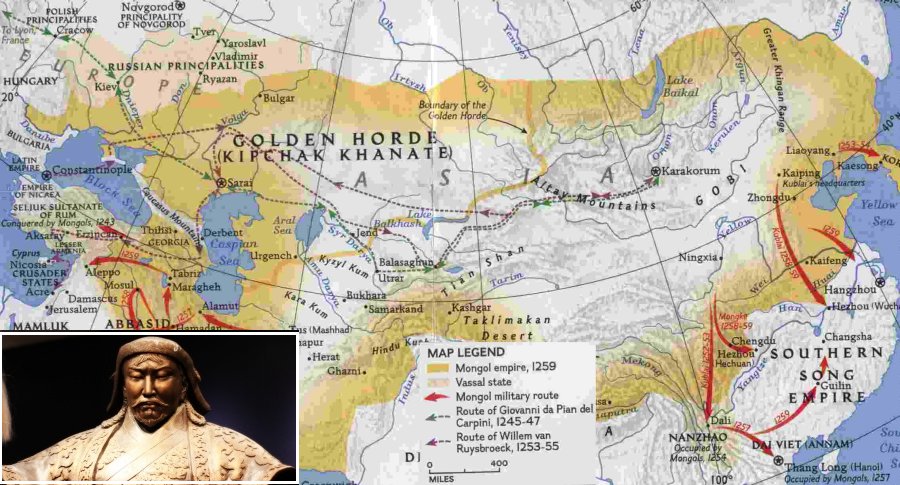
He also encouraged the development of arts and literature.
But Kublai adopted a discriminatory policy towards the people by setting up a class system, which enraged those being discriminated, especially the Hans. In the system, the Mongols were the highest of the four classes; then came the miscellaneous aliens consisting of West-Asian Muslims; then the Han Chinese or the Chinese who lived in Northern China; and last were the Song Chinese or those Chinese who lived in the south. The Mongols considered the Song Chinese the least trustworthy.
Kublai Khan’s reign gradually came to decline. Besides discriminatory policy which worsened social conflicts, his failures were mainly a series of costly wars, including two disastrous attempts to invade Japan. To pay for these highly expensive defeats, Kublai over taxed his subjects. This caused widespread inflation. These wars and other economic problems caused Kublai to become very intolerant.
Kublai Khan died on February 18, 1294, at the age of 79. In the 14th century the ineptitude of his successors provoked rebellions that eventually destroyed the Mongol dynasty.
MessageToEagle.com
Expand for references
